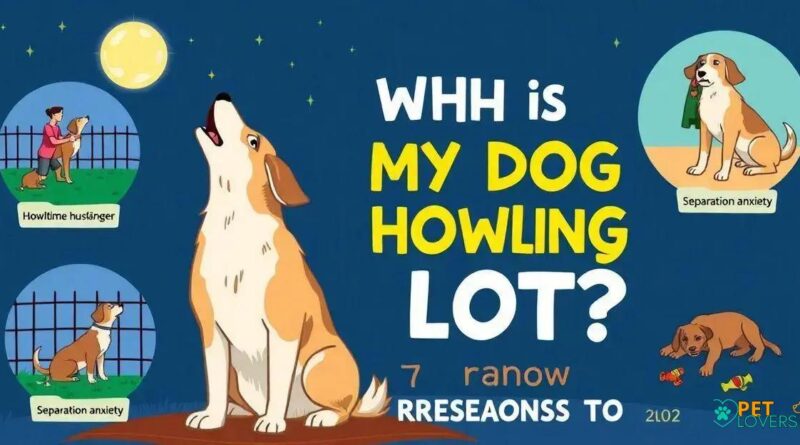Why is My Dog Howling a Lot? 7 Reasons to Know
Dogs may howl for various reasons such as seeking attention, experiencing anxiety, facing medical issues, or feeling bored. To effectively address howling, it’s important to identify the root cause and implement strategies like providing mental and physical stimulation, managing separation anxiety, and using positive reinforcement training. Understanding the reasons behind your dog’s howling can help reduce it and enhance their overall well-being.
Are you tired of coming home to find your furry friend howling incessantly? It’s a common issue many dog owners face, but did you know that there are several reasons why your dog might be howling a lot?
From attention-seeking to medical issues, in this post, we’ll explore the top 7 reasons why your dog is howling a lot and what you can do to address the problem.
Reasons Why Dogs Howl
From attention-seeking to medical issues, there are several reasons why dogs howl. Some dogs may howl due to boredom, while others may howl because they’re trying to communicate with their pack or alert you to potential threats. Understanding the underlying causes of your dog’s howling can help you develop an effective solution to address the issue.
Dogs may howl at night due to a range of factors, including separation anxiety, boredom, or medical issues. If your dog is howling at night, it’s essential to identify the root cause and address it promptly to ensure they get a good night’s sleep and reduce the risk of sleep deprivation for you and your household.
Dogs may howl at strangers due to a combination of factors, including protective instincts, territorial behavior, or social anxiety. Understanding why your dog is howling at strangers can help you develop a plan to address the issue and ensure they feel comfortable and secure in new environments.
If your dog is experiencing separation anxiety, they may howl when you leave the house or when you’re not present. This condition can be managed with training, exercise, and positive reinforcement techniques. By addressing the underlying causes of your dog’s separation anxiety, you can reduce their howling and improve their overall well-being.
Dogs may howl due to boredom if they’re not receiving adequate mental and physical stimulation. To address this issue, it’s essential to provide your dog with engaging activities, exercise, and training to keep them mentally and physically active. By doing so, you can reduce your dog’s howling and improve their overall health and well-being.
Dogs Howling at Night
Dogs howling at night can be a common occurrence, especially for owners who work late shifts or have irregular schedules. It’s essential to identify the underlying causes of your dog’s night howling, which may range from separation anxiety to boredom or medical issues. By understanding the reasons behind your dog’s howling, you can develop a plan to address the issue and ensure they get a good night’s sleep.
Some dogs may howl at strangers due to a range of factors, including protective instincts, territorial behavior, or social anxiety. Understanding why your dog is howling at strangers can help you develop a plan to address the issue and ensure they feel comfortable and secure in new environments. With patience and consistency, you can help your dog overcome their fears and become more confident around strangers.
Dogs howling due to separation anxiety can be a challenging issue to address, but it’s essential to do so to prevent long-term damage to your dog’s mental health. By identifying the underlying causes of your dog’s separation anxiety and implementing training and management strategies, you can help them feel more secure and reduce their howling.
Boredom is a common reason why dogs howl, especially if they’re not receiving adequate mental and physical stimulation. To address this issue, it’s essential to provide your dog with engaging activities, exercise, and training to keep them mentally and physically active. By doing so, you can reduce your dog’s howling and improve their overall health and well-being.
Dogs Howling at Strangers
Dogs may howl at strangers due to a combination of factors, including protective instincts, territorial behavior, or social anxiety.
Protective instincts
can manifest when a dog feels the need to defend its family or territory, while
territorial behavior
can arise from a desire to mark its territory.
On the other hand,
social anxiety
can cause a dog to become fearful or uneasy in the presence of strangers.
By understanding the underlying causes of your dog’s howling, you can develop a plan to address the issue and help your dog feel more confident and secure in new environments.
Dogs Howling due to Separation Anxiety
Dogs howling due to separation anxiety is a common phenomenon that can be distressing for both dogs and their owners.
Separation anxiety occurs when a dog becomes anxious or stressed when left alone, leading to behaviors such as howling, panting, and destructive behavior.
To address this issue, it’s essential to identify the underlying causes of your dog’s separation anxiety and implement training and management strategies to help them feel more secure.
This may involve gradual separation, desensitization, and counterconditioning techniques, as well as providing mental and physical stimulation to reduce anxiety.
With patience and consistency, you can help your dog overcome their separation anxiety and reduce their howling.
Dogs Howling due to Boredom
Dogs howling due to boredom is a common issue that can be prevented with proper stimulation and exercise.
Boredom can manifest in dogs when they are not provided with adequate mental and physical stimulation, leading to behaviors such as howling, destructive behavior, and restlessness.
To address this issue, it’s essential to provide your dog with engaging activities, exercise, and training to keep them mentally and physically active.
This may include activities such as obedience training, agility training, and scent work, as well as providing puzzle toys and interactive games to keep their minds stimulated.
By doing so, you can reduce your dog’s howling and improve their overall health and well-being.
In conclusion, understanding why dogs howl is crucial to addressing the issue effectively. By identifying the underlying causes of your dog’s howling, you can develop a plan to address the issue and improve your dog’s overall well-being.
Whether it’s due to separation anxiety, boredom, howling at night, or howling at strangers, there are various strategies you can implement to reduce your dog’s howling and improve their behavior.
Remember to be patient, consistent, and understanding, as every dog is unique and requires a tailored approach. By working with your dog and addressing their specific needs, you can strengthen your bond and create a happier, healthier relationship.
FAQ – Frequently Asked Questions about Dog Howling
Why do dogs howl?
Dogs howl for a variety of reasons, including attention-seeking, anxiety, medical issues, and boredom.
What can I do to stop my dog from howling?
There are various strategies you can implement to reduce your dog’s howling, including providing mental and physical stimulation, addressing separation anxiety, and using positive reinforcement training.
Why do dogs howl at night?
Dogs may howl at night due to separation anxiety, boredom, or medical issues. It’s essential to identify the underlying cause and implement strategies to address it.
Why do dogs howl at strangers?
Dogs may howl at strangers due to protective instincts, territorial behavior, or social anxiety. Understanding the underlying cause and implementing training and management strategies can help reduce this behavior.
What can I do to address my dog’s howling due to separation anxiety?
To address separation anxiety, it’s essential to identify the underlying cause and implement training and management strategies, such as gradual separation, desensitization, and counterconditioning.
What can I do to address my dog’s howling due to boredom?
To address boredom, it’s essential to provide your dog with engaging activities, exercise, and training to keep them mentally and physically active.





